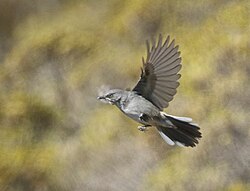| Layard's warbler | |
|---|---|
 | |
| Near Sani Pass, Lesotho | |
| Scientific classification | |
| Kingdom: | Animalia |
| Phylum: | Chordata |
| Class: | Aves |
| Order: | Passeriformes |
| Family: | Sylviidae |
| Genus: | Curruca |
| Species: | C. layardi |
| Binomial name | |
| Curruca layardi (Hartlaub, 1862) | |
| Synonyms | |
| |
Layard's warbler (Curruca layardi) or Layard's tit-babbler, is a species of Old World warbler in the family Sylviidae. It is found in Lesotho, Namibia, and South Africa. Its natural habitat is subtropical or tropical dry shrubland.
